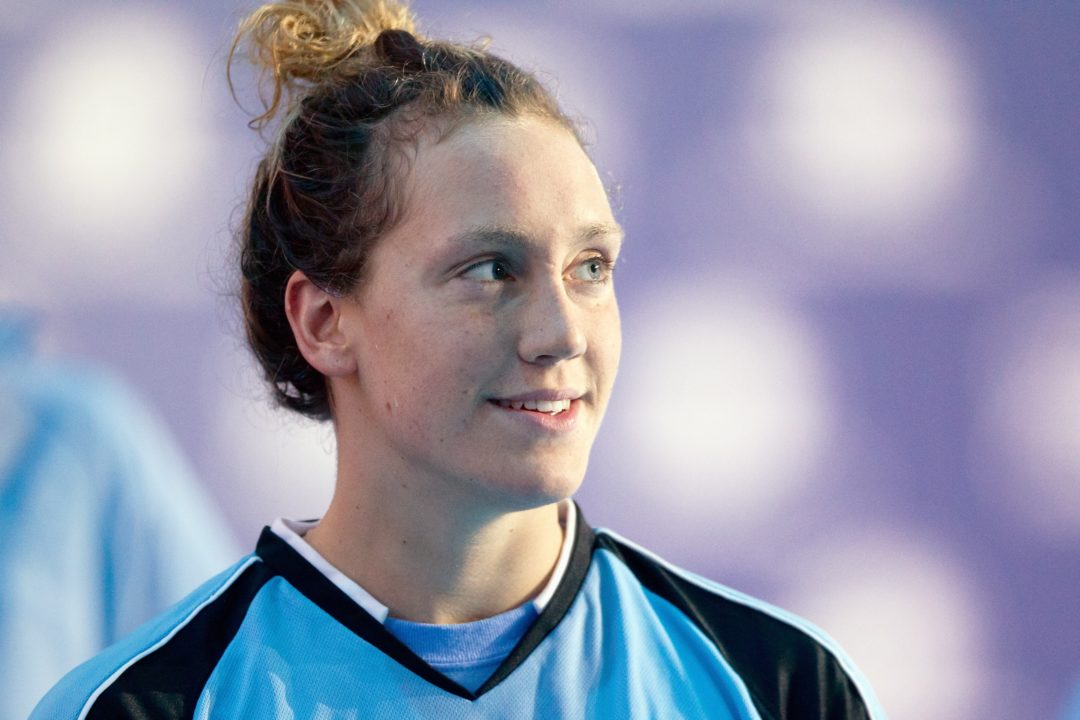27-year old British Olympian Lizzie Simmonds has announced her retirement from competitive swimming in a blog post this week.
Simmonds represented Great Britain at the 2012 Summer Olympic Games, where, in front of a home crowd, she finished 4th in her specialty event, the 200 meter backstroke, in 2:07.26 – which left her 7-tenths behind American Elizabeth Beisel for a bronze medal.
Most of Simmonds’ international hardware came in the first decade of the 2000s, including an individual 200 backstroke gold medal at the 2010 European Long Course Championships, and silver at the 2010 Commonwealth Games in the same event. 2010 was her ‘career year,’ where she swam a 2:07.79 in the 200 backstroke and 59.43 in the 100 backstroke that remained her career bests until retirement. At the time, that ranked her as the 7th-best performer in history, and today still leaves her as 20th-best ever in the race.
Simmons broke SCM National Records in the 50, 100, and 200 backstroke throughout her career, including a 2:00.91 that stood as a Commonwealth Record for a time. She retires still as the British Record holder in the 100 back (56.35) and 200 back (2:00.82).
Simmonds also gave us one of the great swimming Tweets of all time, where she described this exchange with a recreational swimmer:
Lady in public lane: you’re very good at swimming you know..
Me: erm, thanks
Lady: no seriously, you should try and do a trial with the county club!
Me: erm, well I actually went to a couple of Olympics..
Lady: me too! Which sports did you get manage to get tickets for?
🤔
— Lizzie Simmonds (@LizzieSimmonds1) March 10, 2018
The most poignant paragraphs are buried in the middle of the post, where she discusses the highs and the lows of elite sport:
Excerpt from Lizzie Simmonds’ retirement post:
I’ve experienced the highs of elite sport, swimming in multiple Olympic finals with the whole world watching. Once I missed out on an Olympic medal by just a few hundredths of a second. It’s been incredibly exciting to be part of British sport during the last decade, to flow with the tide of success that the athletes and coaches of this nation have created. I feel very proud to have played a small part in that movement. It’s an unbelievable feeling to break records and win championship medals, listening to the national anthem, knowing the years of hard work have paid off. I’ve travelled the world, training and competing in countries across the globe, experiencing exotic cultures with my teammates. My parents’ attic is still filled with thousands of items of team kit from across the years, like a dusty shrine to the Union Jack. Ultimately, I’m very fortunate to have taken my ‘hobby’ to a level where I would walk out at a home Olympics with 20,000 people screaming my name, like a rockstar in goggles. I will carry the memories with me always, they make everything worthwhile.
And to the lows. Elite sport is filled with a rollercoaster of emotions, and the true test comes when things aren’t going so well. Injuries, underperformance, missing team selections, funding cuts—I’ve had a fair share of frustrations and disappointments. For some of these challenging times, I accept responsibility, I feel others were triggered by those in authority who were resistant to athlete autonomy and progressive change. The high-performance system is not infallible, and decisions are occasionally made at the expense of the wellbeing of the athletes, and staff, who are striving so hard to augment the advancement of sport. There has been a lot of criticism from the media about British sport disregarding athlete welfare in favour of producing medal-winning robots, but it will always be difficult to effectively balance the prioritisation of performance with the proactive development of well-rounded human beings.

Great post. Some very interesting observations I’m sure many would share.